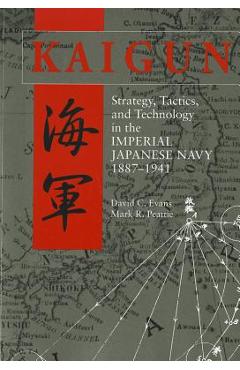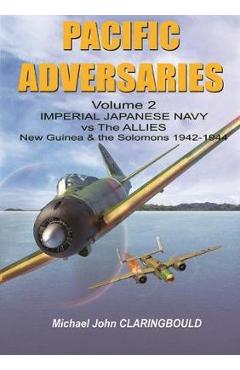Imperial Japanese Navy 1932-1945 Warships and Colours: With Japanese Army Vessels and Three Special Bonus Pages - Malcolm Wright

Detalii Imperial Japanese Navy 1932-1945 Warships
libris.ro
483.23 Lei
536.92 Lei
History
Malcolm Wright
Imperial Japanese Navy 1932-1945 Warships - Disponibil la libris.ro
Pe YEO găsești Imperial Japanese Navy 1932-1945 Warships de la Malcolm Wright, în categoria History.
Indiferent de nevoile tale, Imperial Japanese Navy 1932-1945 Warships and Colours: With Japanese Army Vessels and Three Special Bonus Pages - Malcolm Wright din categoria History îți poate aduce un echilibru perfect între calitate și preț, cu avantaje practice și moderne.
Preț: 483.23 Lei
Caracteristicile produsului Imperial Japanese Navy 1932-1945 Warships
Comandă Imperial Japanese Navy 1932-1945 Warships Online, Simplu și Rapid
Prin intermediul platformei YEO, poți comanda Imperial Japanese Navy 1932-1945 Warships de la libris.ro rapid și în siguranță. Bucură-te de o experiență de cumpărături online optimizată și descoperă cele mai bune oferte actualizate constant.
Descriere magazin:
During World War II, navies developed camouflage for their ships. Applying it to both vertical and horizontal surfaces, they reduced visibility and confused the identities of their ships to the enemy. Maritime artist Malcolm Wright, author of popular books on British naval camouflage schemes in World War II, now turns his attention to the ships and aircraft of the Imperial Japanese Navy and Army from 1932 to 1945. Many schemes included in this volume are difficult to find without intensive research, making this a unique and valuable resource. The book covers every ship type from battleship to the smallest auxiliary, including the riverine craft that fought in China, all the ships in the separate fleet operated by the Imperial Japanese Army, and three special bonus pages describing camouflage schemes for selected hard-to-research ships from other navies. The timespan covered actually goes beyond 1932-45 and includes developmental milestones for each ship and class, from the 1914 construction of the battlecruiser KONGO to the 1946-47 repatriation service of the surviving vessels and their subsequent transfer to victorious navies. At 288 11 x 8.5 pages with half-inch margins and 9-point type, this book offers almost double the content area of the previous volumes in the series, which were 196 10 x 8 pages each, with a somewhat challenging 7-point font. This expansive and reader-friendly layout allows for numerous full-page spotlight views of important and interesting ships and planes, for a total of 952 images and captions. The durable case laminate jacket and 70-pound premium paper assure a long-lasting and pleasant physical experience. The captions combine construction, refit and service histories with sharp personal assessments of ship performance, accompanied by plank-level illustrations of the color schemes applied to ships and planes. Since sadly most pictures of World War II are in black and white, this book is a delight for anyone who wants to visualize the war as it actually occurred, in color. With its unparalled depth of technical detail and breadth of coverage, it is a must-have for students of naval history, the war in the Pacific, wargaming, and ship and aircraft modelling. The highly readable captions combine construction, refit and service histories with sharp personal assessments of ship performance, accompanied by plank-level illustrations of the color schemes applied to ships and planes. Since sadly most pictures of World

Produse asemănătoare

Imperial Japanese Navy 1932-1945 Warships and Colours: With Japanese Army Vessels and Three Special Bonus Pages - Malcolm Wright
![]() libris.ro
libris.ro
Actualizat in 28/10/2025
483.23 Lei

Kaigun: Strategy, Tactics, and Technology in the Imperial Japanese Navy, 1887-1941 - David C. Evans
![]() libris.ro
libris.ro
Actualizat in 28/10/2025
245.24 Lei

Pacific Adversaries. Volume 2: Imperial Japanese Navy vs. the Allies, New Guinea & the Solomons 1942-1944 - Michael Claringbould
![]() libris.ro
libris.ro
Actualizat in 28/10/2025
201.65 Lei

The Imperial Japanese Navy in the Pacific War, Hardcover/Mark Stille
![]() elefant.ro
elefant.ro
Actualizat in 27/10/2025
252.99 Lei

Shokaku-Class Aircraft Carriers: In the Imperial Japanese Navy during World War II, Hardback/Hans Lengerer
![]() elefant.ro
elefant.ro
Actualizat in 27/10/2025
165.99 Lei
Produse marca Malcolm Wright

Imperial Japanese Navy 1932-1945 Warships and Colours: With Japanese Army Vessels and Three Special Bonus Pages - Malcolm Wright
![]() libris.ro
libris.ro
Actualizat in 28/10/2025
483.23 Lei

Imperial Japanese Navy 1932-1945 Warships and Colours: With Japanese Army Vessels and Three Special Bonus Pages - Malcolm Wright
![]() libris.ro
libris.ro
Actualizat in 11/04/2024
874.66 Lei
